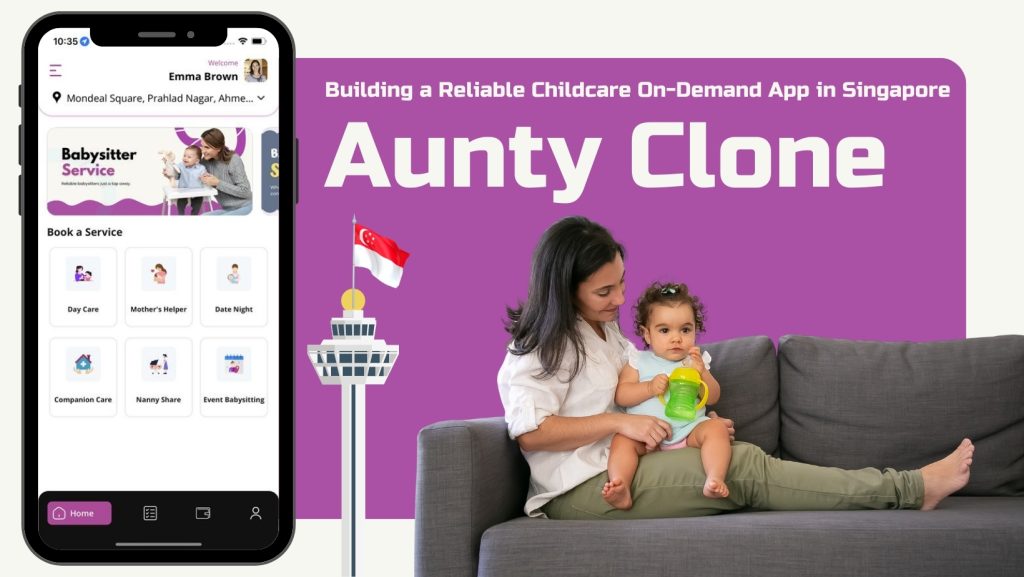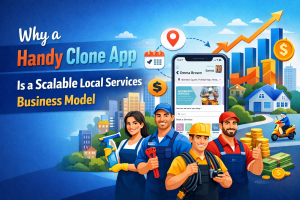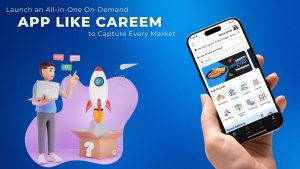
Singapore has gone digital in almost every part of life. Hungry? Tap on a food delivery app. Need a ride? Open a taxi hailing app. Even groceries, laundry, pet care, it’s all on demand now. So it’s not surprising that childcare is moving in the same direction.
Parents, especially working ones, don’t always have the luxury of planning weeks ahead for babysitting. Meetings run late. Appointments pop up. Sometimes, they just need someone safe and reliable, fast. This is where the Aunty Clone comes in. It’s basically a shortcut for entrepreneurs to build their own childcare on demand app in Singapore, without coding it from scratch.
The rise of on demand childcare
The modern parent in Singapore is juggling too much. Long working hours. Commutes. Family commitments. And often no extended family nearby to help with kids. That gap is what fuels childcare apps. They make it possible to connect parents and babysitters in minutes, not days.
An on demand model also matches the way babysitters want to work. Many prefer flexible hours, part time gigs, or evening only jobs. Apps make it simple: create a profile, mark availability, and accept bookings. Parents get help when they need it. Babysitters get more opportunities. Win win.
What an Aunty Clone actually is
Think of the Aunty Clone as the backbone of a childcare app. It comes prebuilt with the core functions, profiles, booking, payments, messaging, and entrepreneurs can rebrand it as their own. Instead of starting with a blank page, you start with a working app.
The best part? It’s not rigid. You can add features that fit Singapore’s needs. Maybe filters for languages spoken. Or options for babysitters with early childhood training. The app doesn’t stay a clone, it becomes unique to the entrepreneur’s vision.
Features parents expect in Singapore
Parents don’t download childcare apps just for convenience. They download them for peace of mind. Some features are absolutely expected:
- Verified babysitter profiles (ID checks, maybe reference uploads).
- In app chat so they can talk before confirming.
- Ratings and reviews to build confidence.
- Simple booking and cashless payments.
- Location based matching, so the babysitter isn’t on the other end of the island.
Without these, parents won’t stick around. With them, an app feels safe and reliable, two words that matter most when it comes to kids.
Local twists that make it work
Singapore isn’t just another market. Parents here are diverse. Some prefer bilingual babysitters. Others look for sitters with infant care experience. A few might even want someone who can help with light tutoring while minding the child.
An entrepreneur launching an Aunty Clone can customise the app to reflect these needs. Add filters for education level. Create a section for special skills like music, sports, or tutoring. Maybe even tie in training workshops for babysitters, so parents know they’re choosing from a trusted pool. These small touches make a huge difference in adoption.
The business side: how money comes in
Of course, apps need revenue. The good thing about childcare on demand apps is that the monetisation models are flexible. Some options include:
- Charging babysitters a small subscription fee to stay active on the platform.
- Taking a commission from each confirmed booking.
- Adding urgent booking surcharges for last minute needs.
- Offering premium features, like verified “top babysitters” who show up higher in search results.
Entrepreneurs don’t have to choose just one. The smartest approach is usually a mix, adjusted over time as the platform grows.
Why branding matters more than people think
Parents won’t trust a generic looking app. It has to feel professional, polished, and personal. White labelling an Aunty Clone means the platform carries your name, your logo, your colours. That builds recognition and credibility.
Owning the source code also matters. It keeps the entrepreneur in control. Want to add eldercare later? Or maybe branch into tutoring? With ownership, those options stay open. Without it, every change requires going back to the developers for permission.
The speed factor
Timing counts. Singapore’s app economy moves fast. If you wait too long, someone else captures the market. A childcare on demand app built from scratch can take a year or more. By then, the opportunity might be gone.
An Aunty Clone can be branded and launched within weeks. That speed frees up entrepreneurs to focus on the harder parts, marketing, building user trust, and growing the babysitter network.
Trust is everything
Technology can’t solve everything. At the end of the day, childcare depends on trust. Parents need to believe the app won’t just connect them with anyone, but with babysitters who are safe, reliable, and right for their kids.
That means entrepreneurs should go beyond the app itself. Consider stronger verification processes. Maybe even insurance or emergency support options. Because while the app is the tool, the trust is the real product being sold.
To tie the whole thing neatly
The on demand culture is reshaping services across Singapore, and childcare is no exception. For entrepreneurs, the Aunty Clone is a quick way to launch a childcare on demand app in Singapore without building one from the ground up. The opportunity is real, but success depends on localisation, smart monetisation, and above all, trust. Get those parts right, and a childcare app doesn’t just become another download, it becomes part of how families manage daily life.

